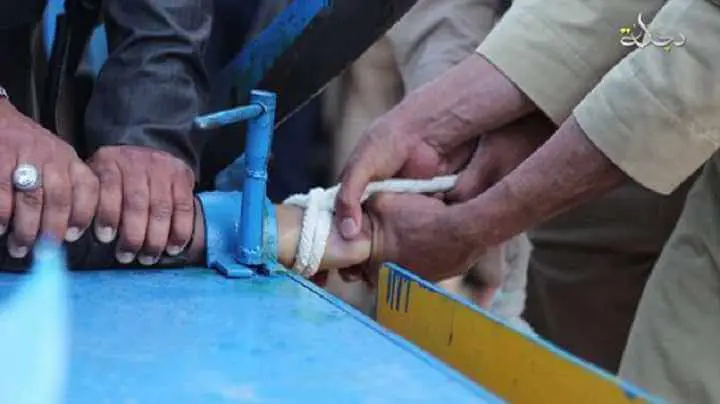As a society deeply rooted in Islamic principles, the Kingdom of Saudi Arabia’s approach to addressing criminal behavior, including punishment for stealing, is guided by the teachings of the Quran and the Sunnah (the recorded sayings and practices of the Prophet Muhammad, peace be upon him).
While the Quranic and Hadith directives on punishment for stealing are clear, the application of this punishment in Saudi Arabia is subject to specific conditions and considerations.
The Quranic and Hadith Perspectives
The Quran explicitly addresses the issue of theft in Surah Al-Ma’idah, verse 38, which states: “[As for] the thief, the male and the female, amputate their hands in recompense for what they committed as a deterrent [punishment] from Allah. And Allah is Exalted in Might and Wise.” (Quran 5:38)
Furthermore, the Hadith provides guidance on the matter. The Prophet Muhammad (peace be upon him) is reported to have said, “If Fatimah, the daughter of Muhammad, were to steal, I would cut off her hand.” (Sunan an-Nasa’i 4891)
The Application of punishment for stealing in Saudi Arabia
According to the Saudi legal system, the hands of a thief can only be amputated if the following six criteria are met:
- The stolen property was properly secured and protected.
- The owner of the stolen property has requested the return of their belongings.
- There are either two witnesses to the theft or the thief has confessed to the crime.
- The value of the stolen property meets a minimum threshold (approximately 80,000 Saudi Riyals).
- The thief is an adult and of sound mind.
- There is no extenuating circumstance, such as a state of famine or extreme poverty, that may have compelled the individual to commit the theft.
1. The Property was Protected
For the punishment of hand amputation to be applied, the stolen property must have been properly secured and protected. For instance, if the thief broke into an office, cupboard, or locker to steal the item, the punishment for stealing could be enforced. However, if the item was left unprotected in a public place and someone simply picked it up, a lighter punishment would be applied.
2. The Owner Requests the Stolen Property
If the owner of the stolen property does not request the return of their belongings, a lighter punishment for stealing may be applied. In other words, if the owner feels pity for the thief and decides not to pursue the matter, there would be no punishment for cutting off the hands.
3. Two Witnesses or Confession
The thief must either acknowledge twice that they committed the crime or there must be two witnesses who declare that they saw the individual stealing. In modern times, this requirement can be replaced by other forms of evidence, such as CCTV camera footage.
4. The Stolen Property has Significant Value
If the stolen item is something with minimal monetary value, such as food, there is a possibility that the thief stole it out of necessity to feed their family due to a lack of means. In such cases, a lighter punishment may be applied.
5. The Minimum Threshold for Theft
According to a Saudi source, the value of the stolen property must be at least 80,000 Saudi Riyals (approximately $21,000) for the punishment of hand amputation to be applied.
6. The Thief is an Adult and of Sound Mind
If the crime of stealing is committed by someone who is not an adult or has an insane mind, the severe punishment of hand amputation will not be applied in Saudi Arabia.
Exceptions and Mitigating Factors
It is important to note that the strict application of hand amputation as a punishment for theft is not always enforced in Saudi Arabia. Historically, there have been instances where the punishment for stealing was suspended or mitigated, particularly in cases where the thief was driven by dire circumstances or the owner of the stolen property did not seek retribution.
For example, during the reign of Caliph Umar ibn al-Khattab, the punishment of hand amputation was not applied to a thief who stole dates during a year of famine, as the Caliph recognized the extenuating circumstances that may have led to the theft. Additionally, Imam Ahmad ibn Hanbal narrated that hands should not be cut for theft when there is a need for that and the people are in famine and hardship.

Balancing Justice and Compassion
The Saudi legal system’s approach to addressing theft reflects a careful balance between upholding the principles of Islamic law and recognizing the complexities of human circumstances. While the Quran and Hadith provide clear directives for punishment for stealing, the Saudi authorities have demonstrated a willingness to exercise discretion and consider mitigating factors in the application of these punishments.
This nuanced approach ensures that the punishment for stealing fits the crime, while also considering the broader social and economic context. By taking into account factors such as the nature of the theft, the thief’s motivations, and the owner’s willingness to forgive, the Saudi authorities strive to maintain a system of justice that is both fair and compassionate.
Evolving Interpretations and Applications
As Saudi Arabia continues to modernize and evolve, the approach to addressing criminal behavior, including theft, is likely to undergo further refinement. The Kingdom’s commitment to upholding Islamic principles while adapting to the realities of the contemporary world will shape the future application of punishment for stealing, ensuring that it remains aligned with the principles of justice, mercy, and societal well-being.


